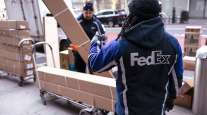U.S. Package Operations Help Boost UPS’ 1Q Earnings
This story appears in the April 30 print edition of Transport Topics.
UPS Inc. posted a 6% increase in first-quarter net income, boosted by the performance of its U.S. package operations.
The Atlanta-based parcel courier said April 26 it earned $970 million, or $1 a share. Global revenue rose 4.4% to $13.14 billion. In the first quarter of 2011, UPS earned $915 million, or 91 cents a share, on revenue of $12.58 billion.
The largest corporation in North American freight transportation brought in 4.5% more volume to its domestic package business, but yield — revenue per unit — grew by just 1.6% as many customers opted for more inexpensive services and shipped lighter- weight parcels.
UPS Freight, the company’s less-than-truckload carrier, broke even.
“During the quarter, the most positive news has come from the U.S., where indications of economic rebound are evident. Retail sales have grown faster than expected, and the employment environment has improved,” Chairman and CEO Scott Davis said during the company earnings call.
“On the other hand, economies in other parts of the world continue to face challenges: Europe struggles under austerity measures, and slowing growth persists out of Asia,” Davis added.
The consensus of Wall Street analysts was that UPS would earn $1.01 a share for the quarter. The miss caused UPS shares to decline in price by 1.8% to $78.25 at the close of trading on April 26 from $79.65 the day before.
“While the earnings-per-share miss was modest, the interpretation could be more meaningful. It’s unclear if the timing of fuel surcharge revenue is skewing the results, or if there might be a broader read across to either the pricing environment and/or package sizes,” analyst Peter Nesvold wrote to clients of Jefferies & Co.
Meanwhile, Davis and Chief Financial Officer Kurt Kuehn said the two main services that have risen noticeably in demand are SurePost and Next-Day Air Saver. SurePost is a hybrid performed in conjunction with the U.S. Postal Service, with UPS doing linehaul work and the Postal Service doing final delivery.
The Saver service relaxes the delivery guarantees for normal Next-Day Air, but the price is less because it’s a little slower. While the two services bring in less revenue per piece, they also cost less to perform. The Saver service is particularly popular with e-commerce shippers sending packages to residences, Kuehn said.
He also said the surge in home refinancing has generated more demand for moving document packages in large flat envelopes.
UPS Freight, the company’s less-than-truckload unit, had a 2.3% increase in total quarterly revenue to $618 million. UPS does not formally report profit levels for Freight, but Kuehn said the LTL carrier “broke even.”
The extra revenue came in because of a 4.5% boost in revenue per hundredweight, or LTL yield, to $21.47 from $20.54, but the company could not turn that into a profit because the number of shipments dropped by 2.3% and gross tonnage declined by 2.2%.
“We’re trying to find the right balance of growth and yield,” Kuehn said of management efforts at UPS Freight.
Commenting on the state of the LTL market, Kuehn said that “some of the players in the market are getting a little more aggressive.”
Global package volume was 15.6 million a day, a 4.3% increase from 2011’s first quarter. Of that total, 11 million a day were U.S. ground packages, up 4% from a year ago.
The International Package business had an increase in revenue but a decline in operating income. The division suffered from weakness out of Asia, increased fuel costs and shifts in trading patterns.
Longhaul lanes such as Asia-Europe and Asia-North America had less volume, while intra-Asia and intra-Europe did better, Kuehn said.
With regard to the proposed $6.8 billion acquisition of Dutch parcel company TNT Express, Davis said he expects the deal, announced in March, to close by the end of this year. He said conversations with regulators concerning approval have begun.




